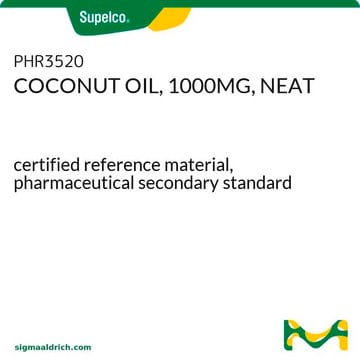C1758
Coconut oil from Cocos nucifera
low-melting solid
Synonym(s):
Coconut fat, Copra oil
Sign Into View Organizational & Contract Pricing
All Photos(2)
About This Item
Recommended Products
biological source
Cocos nucifera
form
low-melting solid
mp
23-27 °C
lipid type
oils
shipped in
ambient
storage temp.
room temp
Looking for similar products? Visit Product Comparison Guide
Related Categories
Application
- Linseed, Baru, and Coconut Oils: NMR-Based Metabolomics, Leukocyte Infiltration Potential In Vivo, and Their Oil Characterization. Are There Still Controversies: This research utilizes NMR-based metabolomics to explore the biochemical properties of various oils, including coconut oil, and investigates their potential for leukocyte infiltration in vivo. The findings contribute to understanding the health implications and biochemical interactions of coconut oil (Figueiredo et al., 2022).
Physical form
Usually a solid at room temperature
Storage Class Code
11 - Combustible Solids
WGK
WGK 1
Flash Point(F)
>235.4 °F - closed cup
Flash Point(C)
> 113 °C - closed cup
Personal Protective Equipment
dust mask type N95 (US), Eyeshields, Gloves
Choose from one of the most recent versions:
Already Own This Product?
Find documentation for the products that you have recently purchased in the Document Library.
Customers Also Viewed
Ryan Pannorfi et al.
Physiological and biochemical zoology : PBZ, 85(4), 405-414 (2012-06-19)
Heterothermic rodents increase self-selection of diets rich in polyunsaturated fatty acids (PUFAs) when exposed to cold, short days, or short-day melatonin profiles, and Djungarian hamsters (Phodopus sungorus) do so in long days in response to cold exposure alone. To determine
Young Taek Oh et al.
Physiology & behavior, 167, 194-201 (2016-10-25)
Previous rodent studies showed that when injected into the brain, free fatty acids (FFAs) reduced food intake in an oleate-specific manner. The present study was performed to test whether food intake is regulated by circulating FFAs in an oleate-specific manner.
G Paul Amminger et al.
Canadian journal of psychiatry. Revue canadienne de psychiatrie, 58(7), 402-408 (2013-07-23)
To investigate whether long-chain omega-3 (n-3) polyunsaturated fatty acids (PUFAs) improve functioning and psychiatric symptoms in young people with borderline personality disorder (BPD) who also meet ultra-high risk criteria for psychosis. We conducted a post hoc subgroup analysis of a
Mohan N Harihara Iyer et al.
Archives of animal nutrition, 66(4), 271-282 (2012-08-28)
The present study was conducted to assess whether the partial replacement of feed energy by vegetable oils containing high medium-chain saturated fatty acids (MCFA) and n-6 polyunsaturated fatty acids (PUFA) would modify lipogenic gene expression and other parameter of fat
C Reveneau et al.
Journal of dairy science, 95(4), 2046-2060 (2012-03-31)
Monensin (tradename: Rumensin) should reduce the extent of amino acid deamination in the rumen, and supplemental fat should decrease protozoal abundance and intraruminal N recycling. Because animal-vegetable (AV) fat can be biohydrogenated in the rumen and decrease its effectiveness as
Our team of scientists has experience in all areas of research including Life Science, Material Science, Chemical Synthesis, Chromatography, Analytical and many others.
Contact Technical Service








